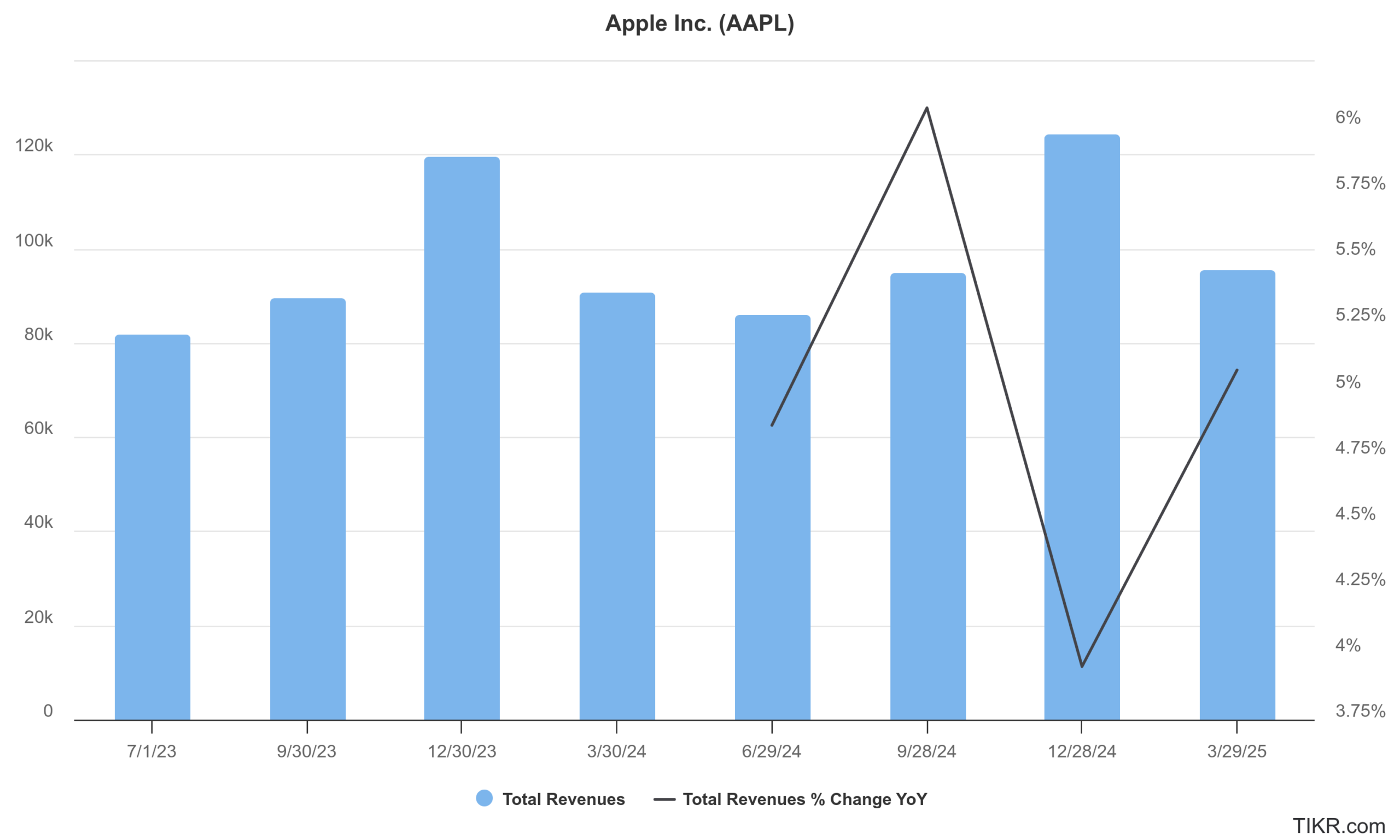Epic Games Submits Fortnite for Apple US App Store Review After Legal Victory
Please note that we are not authorised to provide any investment advice. The content on this page is for information purposes only.
Epic Games submitted its popular game Fortnite for a US review on the Apple App Store days after it won a legal victory from a federal judge. The iPhone maker booted the app in 2020 over what it called a violation of its App Store rules, which led to a legal battle between the two companies.
For context, in August 2020, Epic Games allowed Fortnite’s in-game currency to be used directly instead of routing it through the App Store. Apple (NYSE: AAPL) charges anywhere between 15%-30% for in-app purchases, and the hefty fees have long been a bone of contention with several developers. Epic Games sued Apple for monopoly, and in 2021, US Federal Judge Yvonne Gonzalez Rogers ruled that Apple should allow developers to use cheaper payment options.
Table of Contents
Epic Games Sued Apple Over App Store Policies
However, in 2024, Epic Games accused Apple of not complying with the order and instead charged developers new fees. In a recent order, Judge Rogers lashed out at Apple in her 80-page ruling.
“Apple, despite knowing its obligations thereunder, thwarted the Injunction’s goals, and continued its anticompetitive conduct solely to maintain its revenue stream. Remarkably, Apple believed that this Court would not see through its obvious cover-up (the 2024 evidentiary hearing),” she said in her judgment.
She warned the iPhone maker that “Apple’s continued attempts to interfere with competition will not be tolerated.” Rogers added, “This is an injunction, not a negotiation. There are no do-overs once a party willfully disregards a court order.”
Apple disagreed with the court order and said it will appeal the decision. Epic Games CEO Tim Sweeney, meanwhile, sees the order as a big win not only for his company but also for developers and consumers in general.
“It forces Apple to compete with other payment services rather than blocking them, and this is what we wanted all along,” said Sweeney while speaking with reporters. In a social media post, Epic Games said, “Apple’s Motion to Stay is a last-ditch effort to block competition and extract massive junk fees at the expense of consumers and developer.”
Apple Risks Losing Out on Revenues
While Apple does not break down the revenues that it receives through the App Store fees, they are part of its hugely profitable Services business, whose gross margins are about twice that of the product business. The segment reported record revenues of $26.6 billion in the March quarter, which were up 12% YoY despite adverse currency movements. Notably, while in previous quarters, Apple used to provide some color on the segment’s revenue guidance, it refrained from doing so, citing “uncertainty from several quarters.”
Apple has warned of a hit of “hundreds of millions to billions” due to the proposed rules. Notably, Apple had to allow third-party app stores in the European Union under the region’s Digital Markets Act.
Apart from the dispute over the App Store fees, Apple is also facing the heat over its exclusive deal with Alphabet, wherein Google is the default search engine on iPhones. Apple earns around $20 billion annually as part of the deal, and regulators want Google to end such exclusive agreements.
Alphabet DOJ Case
The question over Epic Games and Google popped up during Apple’s fiscal Q2 2025 earnings call, too. Responding to an analyst’s question over these concerns, CEO Tim Cook said, “The case yesterday, we strongly disagree with. We’ve complied with the court’s order, and we’re going to appeal,” referring to the Epic Games case.
On the US Department of Justice’s case against Google, Cook said, “that case is ongoing and I don’t really have anything to add beyond that. And so, we’re monitoring these closely. He, however admitted, “there’s risk associated with them and the outcome is unclear.”
Overall, the legal cases add another layer of uncertainty for Apple at a time when it is already facing multiple headwinds.
AAPL Is Facing Tariff Heat
Apple finds itself in the crosshairs of the trade war. While President Trump exempted smartphone and tech products from the 125% reciprocal tariffs that he imposed on China, they are still subject to the 20% fentanyl-related tariffs that he previously announced.
Apple, meanwhile, has said that for US sales, it will source almost all of its iPhones from India and other products like Mac and iPads from Vietnam in the coming months. Meanwhile, looking at the US-UK trade deal, a base tariff might still apply to imports, which Trump said would be a minimum of 10%.
Apple Is Losing Market Share in China
Meanwhile, growing US-China tensions are also working to the detriment of US brands. China is increasingly becoming a tough market for foreign brands like Apple, General Motors, and Starbucks, and they have been losing market share to domestic Chinese companies.
Apple lost its position as the biggest smartphone seller in China last year and fell to the third spot as domestic Chinese rivals gained market share at the iPhone maker’s cost. Vivo was the top-selling brand in the world’s second-biggest economy last year, followed by Huawei, whose sales have surged over the last two years.
According to data from research firm Canalys, Apple’s shipments in China fell 17% YoY in 2024, which was the biggest annual decline for the Cupertino-based company. Moreover, its shipments fell in all four quarters, with the pace of decline widening to 25% in the fourth quarter.
Apple had a full-year market share of 15% in China last year, while Huawei and Vivo had 16% and 17% market share, respectively. Huawei has come up with competitively priced premium models and has grabbed significant market share from Apple.






